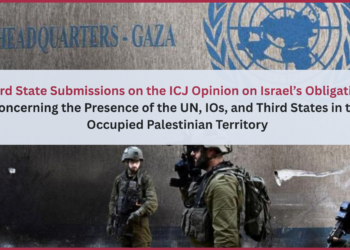Law for Palestine Gathers Experts to Unpack the ICJ Advisory Opinion on the Illegality of the Israeli Occupation and Address Potential Next Steps
On 29th July 2024, Law for Palestine, in collaboration with Jadaliyya, hosted a panel discussion titled “Turning Ink Into Action: Unpacking the ICJ Advisory Opinion on Palestine and the Next Steps.” The panel analysed the International Court of Justice’s (ICJ) crucial and historic Advisory Opinion that addressed the unlawful character of the prolonged Israeli occupation of the Palestinian Territory and outlined the expected measures to end the occupation, including the responsibility of third states and UN agencies.
Moderated by Anisha Patel, Board Member at Law for Palestine, the event featured three experts: Ardi Imseis, Professor of International law, Queen’s University and Legal Counsel for the State of Palestine in the ICJ Advisory Opinion (2024); Michael Lynk, Associate Professor at the Faculty of Law at Western University and the Former UN Special Rapporteur for the Occupied Palestinian Territory; and Shahd Hammouri, Lecturer in International Law at Kent University and legal advisor at Law for Palestine. ICJ advisory opinion next steps
Ardi Imseis: the ICJ Advisory Opinion is a groundbreaking moment that introduces a paradigm shift in international law
Ardi described the ICJ Advisory Opinion as a “groundbreaking moment,” bringing about a paradigm shift in international law on Israel and Palestine. Imseis clarified that in this opinion, the ICJ described the existence of the Israeli occupation of the occupied Palestinian territory (oPt) illegal as a whole, rather than discreet individual violations of the laws of war or human rights law by the occupying power that have been documented for decades. This unlawful presence of the occupying state gives rise to legal consequences and obligations for Israel, third states, and the UN.
Imseis outlined that the first and foremost obligation on Israel, according to the ICJ, is to end its occupation of the Palestinian territory “as rapidly as possible.” He clarified that this is a unilateral and unconditional obligation that cannot be subject to negotiations. The Court stated that Israel is obliged to make appropriate forms of reparations for the damage to natural or legal persons brought about by the virtue of its illegal presence. According to Imseis, the ICJ identified certain reparations including, restitution of property and the return of 1967 refugees. He added that when restitution is not materially possible, the ICJ indicated that the occupying state has the obligation to make appropriate forms of compensation.
Recalling Israel’s violations of peremptory norms that trigger third states responsibility, Imseis clarified that third states are under the obligation not to recognize the legality of Israel’s presence in the territory which encompasses the West Bank, including East Jerusalem and Gaza. Ardi stated that self-determination of the Palestinian people rests at the heart of this case and the only thing that is impeding Palestinians from exercising full sovereignty over their territory, their natural resources, is the action of an aggressive occupying power, Israel, being there unlawfully. He outlined that the illegal act is the occupying power’s very presence in the territory, it is there as an aggressor, and hence third states are under the obligation to not aid or assist the continued presence of Israel in the oPt.
Imseis further explained that the ICJ Advisory Opinion will affect bilateral relations between Israel and third states, which are required to review their economic, military, political, social, cultural and diplomatic relations with Israel. He stated that an arms trade embargo is on the table, especially since the Israeli military industrial complex has used the oPt, for generations, as a training ground for its troops and its military technology before selling it to the world as battle tested.
Imseis further explained that the ICJ Advisory Opinion will affect bilateral relations between Israel and third states, which are required to review their economic, military, political, social, cultural and diplomatic relations with Israel
Moving to the UN obligations arising from this Advisory Opinion, Imseis stressed that the UNGA in particular, and the Security Council also, should determine the modalities of how to end the Israeli unlawful presence in the oPt. Imseis argued that the Advisory Opinion carries substantive weight due to its reliance on customary international law and the authority vested in the ICJ. The ICJ is a court established to adjudicate matters of international law, which the international community has agreed to be bound by.
Imseis concluded his remarks by stating that this Advisory Opinion could be much more impactful than its 2004 predecessor due to its wide scope and that once states review the Opinion, we can expect fundamental changes in how Israel, now a racial segregation and apartheid State, is handled on the international plane. He emphasised on the potential of this advisory opinion to be the “wind in the sails” of the boycott, divestment and sanctions movement and the critical role civil society will play in keeping the pressure up and forcing a cost on Israel, which is engaged in racial segregation and apartheid in the occupied Palestinian territory.
Michael Lynk: the ICJ Advisory Opinion is a critical tool for enforcing international law and promoting justice
Lynk expressed skepticism about Israel’s compliance with the Advisory Opinion and discussed the potential repercussions if Israel continues to ignore the ICJ’s directives, including increased international isolation and pressure from various global actors, such as states and civil society organizations. This pressure could manifest in economic sanctions, diplomatic censure, and other measures aimed at compelling Israel to adhere to international legal standards. Lynk acknowledged the comprehensiveness of the Advisory Opinion and placing it in the context of the ongoing assault on Gaza, he expected states at the UNGA, especially from the Global South, to take actions with respect to Israel.
Lynk drew parallels between the 2024 ICJ Advisory Opinion on Israel’s presence in the Palestinian territory and the 2019 ICJ Opinion on UK’s incomplete decolonisation of the Chagos Archipelago. In the Chagos Opinion, the ICJ utilises the same legal vocabulary it used in respect to Israel’s occupation of the oPt, determining that Israel must withdraw “as rapidly as possible.” Michael outlined that the UNGA deals with situations on a case-by-case basis, but by setting a 6-month deadline for the UK to withdraw from the Chagos Archipelago, the UNGA had established a precedent for what it understands to be “rapid” withdrawal in response to an Advisory Opinion. He anticipates that one of the things that we may see from the General Assembly is the fixing of a specific date by which Israel is required to end its occupation of the oPt and the consequences that could be triggered if Israel does not comply.
Regarding the role of the Security Council, Michael Lynk pointed to Article 25 of the UN Charter, which allows the UNSC to unseat a state. He also explained that it is only the Security Council that can expel a member state, but the General Assembly does have the ability to put restrictions on a state for non-compliance with the UN Security Council resolutions and other violations. He suggested that we might see this invoked by states if Israel continues to claim its practices in the oPt as legal and defy UNSC resolutions on annexation, on the illegality of the settlements, and on the application of the Fourth Geneva Convention.
Michael stated that his interpretation of the ICJ’s Opinion is that Israel’s discriminatory legislation in the oPt constitutes racial segregation and apartheid as it practices “systemic discrimination based on race, religion, or ethnic origin” in violation of the International Covenant on Civil and Political Rights and the International Covenant on Economic, Social and Cultural Rights as well as Article 3 of the International Covenant on the Elimination of All Forms of Racial Discrimination. Lynk articulated aspects of the Opinion that detail specific actions taken by Israel, which informed the Court’s opinion on the apartheid question including the physical fragmentation of East Jerusalem and the West Bank, and the different and unequal legal systems that govern settlers and Palestinian peoples in the oPt. Highlighting recent calls from civil society to reinstate the UN Special Committee Against Apartheid, Lynk expects the General Assembly could discuss this in light of the Opinion.
Highlighting recent calls from civil society to reinstate the UN Special Committee Against Apartheid, Lynk expects the General Assembly could discuss this in light of the Opinion.
Lynk concluded with the importance of the ICJ’s Advisory Opinion as a critical tool for enforcing international law and promoting justice for the Palestinian people. He stated that there has to be a cost placed on Israel and accountability measures to bring its prolonged illegal occupation to an end. Lynk called on the international community to take seriously its responsibility to ensure compliance with the Court’s rulings, highlighting the broader implications for global governance and the rule of law.
Shahd Hammouri: the ICJ Advisory Opinion stresses on the gravity, systematicity, prolonged, and structural nature of the violations committed by the State of Israel
Hammouri highlighted the gravity, systematicity, prolonged and structural nature of the violations committed by the State of Israel. She stated that the Opinion emphasised the illegality of the Israeli occupation and called on third states to refrain from economic dealings such as trade or investment relations which may entrench Israel’s unlawful presence in the territory. Hammouri argued that this suggests that the Court envisions third states’ responsibility as larger than previously thought, including, to refrain from contributing to Israel’s war economy as a whole, not just certain aspects of it. ICJ advisory opinion next steps
Shahd explained these steps should be taken by third states, in addition to heeding the calls for an arms and weapons embargo and economic sanctions, as they have an active duty to assess and measure their own influence to affect the Israeli war economy and the sustenance of these grave violations. She criticised Germany’s differentiation between weapons and other military parts, arguing that this tactic is used to mask states contributions to Israel’s war economy and the continuation of illegalities. Hammouri emphasised that Court clearly articulated that security concerns cannot be understood to override international legal obligations. She called on states to address their involvement in potential acts of genocide as a matter of compliance with international law.
Furthermore, Hammouri stated that civil society groups in these states play an important role in this process and urged civil society organisations to demand transparency from states and to call for states to re-evaluate their contributions to Israel’s war economy and cease their support. This, she asserted, is essential for holding states accountable and promoting adherence to international law.
Under international criminal law, it is not out of the question that corporations like arms manufacturers could be tried for complicity in genocide.
Hammouri stressed on the fact that corporations still hold duties under international law, even when states do not comply. She highlighted that recently, the Working Group on Business and Human Rights had sent letters of warning to some of the biggest arms producers in the world and that under international criminal law, it is not out of the question that corporations like arms manufacturers could be tried for complicity in genocide.
Finally, Shahd emphasised that it is imperative to ensure that these obligations are indeed enacted and to ensure that the language of international law takes its effect not just through state action but also through street action.
The discussion concluded with an emphasis on the Advisory Opinion as a tool to building the path towards justice and a structure that is going to recognize justice instead of bowing down before power. The speakers stressed the importance of international solidarity and the need for a coordinated effort to uphold international law, including by third states, the UN, and the civil society, to ensure the fulfillment of the right of the Palestinian people to self-determination.
- For the full recording, click here
ICJ advisory opinion next steps





